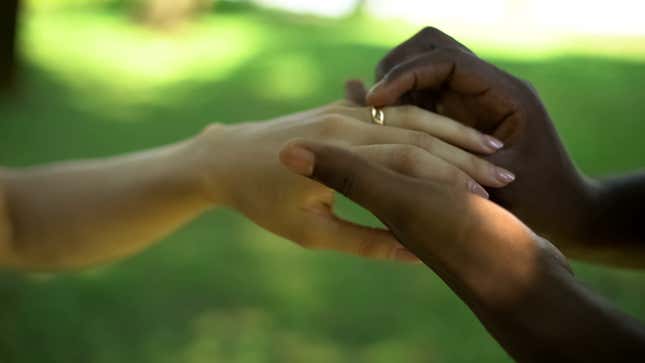
Three couples in Virginia are invoking the names of Richard and Mildred Loving, the couple whose fight to be legally wed led to the striking down of laws banning interracial marriage, in their quest to stop Virginia from requiring racial ID — including outdated or outright offensive terms like “quadroon,” “mulatto” and “Aryan” — in order to get a marriage license.
The law in question dates to the 1920s, first enforced by a Virginia bureaucrat named Walter Plecker who forthrightly compared his work to “that done in Nazi Germany,” according to a federal lawsuit filed by the couples against the state, the Richmond Times-Dispatch reports.
The law, according to the suit, was part and parcel of Virginia’s laws banning interracial marriage, and Plecker, the couples allege, “made it his mission to secure proper enforcement of Virginia’s law banning the marriage of whites and non-whites,” the Times-Dispatch reports.
It would be some 40 years before the Lovings would take Virginia to court to win their right to be legally married, in a case that ended up before the U.S. Supreme Court called Loving v. Virginia.
But despite the high court overturning Virginia’s (and the nation’s) anti-miscegenation laws by ruling in favor of the Lovings, vestiges of the past apparently still survive in Virginia — as well as in seven other states that require folks who want to get married to identify their race, the news site explains.
One of the couples suing the state, Brandyn Churchill and Sophie Rogers, say that when they applied for a marriage license in Rockbridge (Va.) Circuit Court, they were given a list of approved races from which to choose, according to the Times-Dispatch. That list included the following designations: American, Aryan, Blanc, Hebrew, Islamic, Israelite, Jew, Mestizo, Mulatto, Nordic, Octoroon, Quadroon, Red, Teutonic and White American.
The couple, who acknowledge being of European descent — “white or ‘peach-pink’ per the lawsuit,” according to the Washington Post — say they thought taking the state to court would be “a small way” to help challenge Virginia’s racist past.
“A lot of these issues are structural. They’re complicated,” Churchill told the Post. “The history of the law is deeply offensive as are the categories. This is an example of a reform we could have an impact on and move the ball forward a little bit.”
Another of the couples taking part in the suit, Ashley Ramkishun and Samuel Sarfo, told the Post they were told by a marriage clerk to select “other” if they deemed that none of the other designations fit; a choice they found offensive.
“We don’t want to put ‘other’ because we’re not ‘other. ’ We are human beings,” said Ramkishun, who is of Asian Indian and Guyanese descent.
Her fiance, Sarfo, who is from Ghana, says he also shuns racial categorizations and says Virginia should get rid of the question altogether or make answering it optional.
In an email Friday to the Times-Dispatch, a spokesman for Virginia Attorney General Mark Herring said: “Although it’s not readily apparent why state law requires the collection of this data on the marriage license application, we will examine the complaint closely and carefully to determine how best to proceed.”
That said, some advocates for racial equality did raise a concern about doing away with racial categorization completely: How would watchdogs be able to codify and address issues of discrimination without labels to define it?
As the Post explains:
Civil rights groups rely on government data to investigate inequality in schools and the criminal justice system and challenge voting restrictions.
“We need data on who people are in order to see if there are patterns,” said Myrna Pérez of the Brennan Center for Justice.
A Syracuse University law professor who’s studied interracial marriage raised similar concerns with the Post:
“I think with the deep history of racial strife we have in the United States, these categories are going to remain incredibly important,” Professor Kevin Maillard said. “My mother is racially mixed, but she considers herself a black person.”
However, he said it wasn’t clear why a state would need such information on a marriage license application, telling the Post:
“I don’t know what the compelling reason that the state would have in retaining tracking of those categories would be.”

